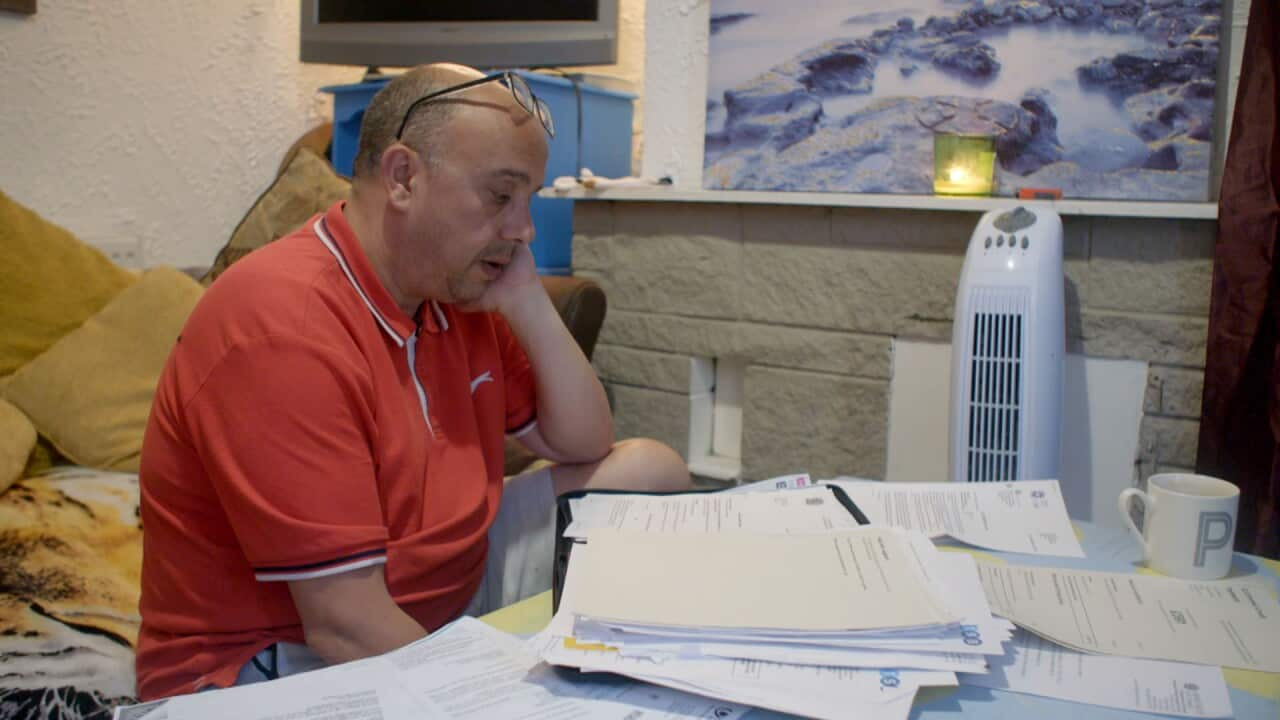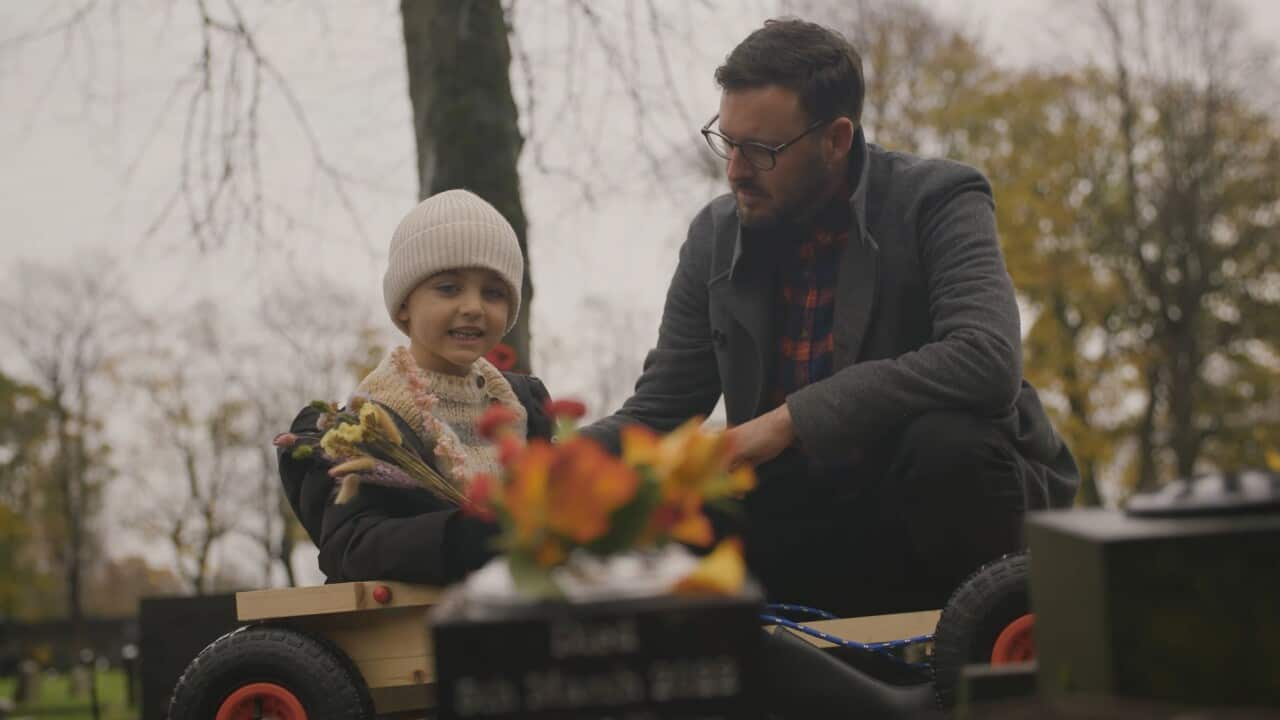Sitting on a couch in his Manchester home, Paulo is constantly on edge, jumping at the sound of a knock and scanning for anyone trying to peer through his window. He’s already boarded up the glass above his front door to stop any passersby from looking in.
The potential visitors terrifying Paulo are bailiffs, debt collectors that may visit homes to demand money or assets for outstanding debts. Three weeks earlier, bailiffs knocked on his door and demanded he pay his debt within two months.
“The bailiffs even look through the curtains. I’m constantly curtain-twitching and seeing who’s outside,” Paulo said.
Paulo owes thousands of pounds in council tax arrears, utility bills and unpaid fines. He gave up his job four years ago to look after his son full-time. They live on £600 (around $1,100) a month from government support, and the money doesn’t come close to covering the expenses.
Paulo is one of the growing number of Britons for whom the cost of living crisis is making it harder to get by and who are plunging deeper into debt. In the United Kingdom, households are experiencing the largest collapse in living standards since records began. In the space of a year, electricity bills have more than doubled and people are having to borrow money to keep the lights on.
“Trying to keep on track of it all, it’s just physically impossible,” he said, staring at a table laden with papers.
“Utility bills when you can’t afford to pay it cause you haven’t got the money or the resources. It’s just mounting up and mounting up and mounting up.”

Citizens Advice, a network of charities across the UK that provides free financial advice, says its helplines have been inundated with calls from people struggling with debt. Credit: Still from the documentary
In January, the UK government announced it would provide additional cost-of-living support for low-income households.
But Citizens Advice, a network of charities across the UK that provides free financial advice, says its clients are still struggling and its call centres have been receiving an influx of calls from people with major debt.
According to the organisation, one in four British adults have fallen into debt in the past 18 months. They’re calling it a “debt time bomb” and saying that the number of people whose income doesn’t cover essential expenses has gone up.
Citizens Advice says more than two million people in England and Wales have been contacted by bailiffs since the cost-of-living crisis began. Of those, one-third experienced intimidating behaviour.

Citizens Advice says nearly half of their clients are unable to pay their council tax bills. Many, like Paulo, are overwhelmed by demanding letters. Credit: Still from the documentary
One of the bailiffs eventually agreed to split Paulo’s debt into four £100 payments. Paulo seemed relieved although it means he has to make further cutbacks in his sparse family budget as he sends his son back to school.
“It’s stressful because I don’t want him going into school thinking he hasn’t got anything. I’ve had to put him in his old school uniform, but you have to do things to survive ,” he said.
Other bailiffs continue to visit his home.
Many in debt for the first time
People experiencing financial hardship are particularly vulnerable to advertising from companies offering quick loans or to “simplify” their existing debts while failing to mention high interest rates or hidden fees.
In Southend, Carly first came to the Citizen Advice office to get food vouchers.
Losing several close family members within two years took a heavy toll on her mental health, and she had to cut back on working hours as a deputy manager at a local supermarket.
Cash-strapped, Carly ended up taking out a series of fast loans to keep up with everyday expenses. She now owes £20,000 (almost $40,000).
“You’re not really thinking of the consequences either. You’re just thinking of the now. The money to get food , electric, gas,” she said.
The interest rate on £500 Carly borrowed from one of the companies, Loans2Go, was 180 per cent per year.

Carly racked up thousands of pounds in debt by taking a series of fast loans to cover everyday expenses. Credit: Still from the documentary
“Cause I'm sure I'm not the only one but there are probably thousands of people out there in the same situation.”
Citizens Advice says many people, like Carly, are finding themselves in debt for the first time. But it’s not just the number of people with high debt that’s worrying the charity, they’re also concerned about the number of people entering Individual Voluntary Arrangements (IVAs).
Carly decided to enter into an IVA in the hope of simplifying her debt which was spread across multiple companies and was spiralling out of control. But by the time she sought professional advice, it was too late.
An IVA is an arrangement that allows a debtor to repay their creditors by making monthly payments over a set period of time. However, Citizen Advice warns that IVA firms charge high front-loaded fees, and many people get trapped in a cycle where their money goes towards fees rather than their actual debt.

Being in deep debt, Carly is relying on food vouchers to feed her family. Credit: Still from the documentary
Unable to cancel her IVA, Carly is relying on a food bank to help feed her family while she sorts out paying back the debt.
“I’ve never seen myself like this, worrying about ‘Have I got enough food to make it to the weekend or until I’ve got the next lot of money coming in?’ And at the moment, the answer is no,” she said.












